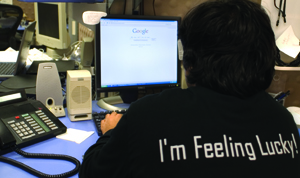
With the Google Gadget Awards now open to college students throughout the country, it comes as a bit of a surprise that Binghamton students from the Watson School of Engineering are not rushing to get their ideas completed first. That’s probably because they weren’t aware of it until recently.
The awards are an opportunity for student computer whizzes and technology lovers to showcase their talent by creating “gadgets.” A gadget, according to a Sept. 20 Google press release, is a “content-filled module, or mini-application,” that helps to personalize Google Web pages. Yahoo and Apple use similar items called “widgets.”
The gadgets will be judged by some of the top professionals in the computer technology industry. Winners of the contest will receive a trophy and promotion through the Google Web site.
Some of the judges of the Google Awards include John Hennessy, president of Stanford University, and Chris Anderson, editor-in-chief of Wired Magazine, among others. The different categories include “Most Useful Gadget,” “Most Intelligent Gadget,” “Gadget Most Likely to Help You Get a Date,” “Most Addictive Gadget,” “Prettiest Gadget” and “Best Overall Gadget.”
“The awards are a terrific opportunity for students to build their resumes while getting serious bragging rights with their friends, even if they only have a little experience with Web design or programming,” reads the press release.
Meanwhile, Google was on campus on Sept. 28 for a presentation on the difficulties of being a large company in a high tech market and to encourage students to look for jobs with them after graduation.
The press release about the Google Gadget Awards came over the University Wire Service, which distributes stories and releases from hundreds of college newspapers nationwide. But most BU professors and students weren’t aware of the contest’s existence until quite recently — one Watson professor said that many faculty members had still not received any notification.
Even so, within Binghamton University, a number of homegrown computer science contests are hosted throughout the year in clubs and some courses. In particular, BU’s chapter of the Association for Computer Machinery generally holds a contest once a month, with cash prizes for the winners.
According to the ACM’s Binghamton Web site, the contests are modeled after the “ACM International Collegiate Programming Contest,” with the exception that their contests are two hours long rather than five. The ACM looks to better students’ programming skills through the contests, along with scouting for members for its national team.
Additionally, a robotics course offered through the Watson school during the second semester offers an in-class contest at the end of the year.
One BU student’s gadget is of a slightly different — and more literal — sort. The device can wirelessly access one’s music, news and weather off the Internet while sitting on a dresser, said inventor Avery Zycherman. Zycherman recently had the gadget, named “Sophia,” built by a studio in New York City.
“[Sophia] is totally expandable,” Zycherman said. “So if you [are a computer developer] and want the device to make your coffee in the morning or something like that … you can do it.”
While it was unclear how a wireless desktop newsbug could make coffee, Zycherman is just one of many students around the country infused with the spirit of invention, many of whom will likely be participating in the Google contest.
To enter the contest, students can visit google.com/gadgetawards by Nov. 1, 2006.


